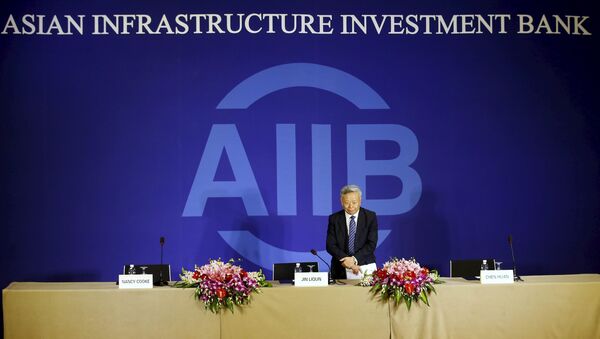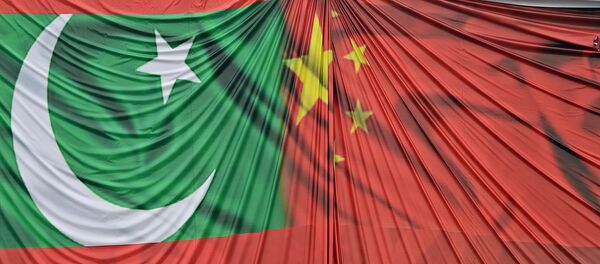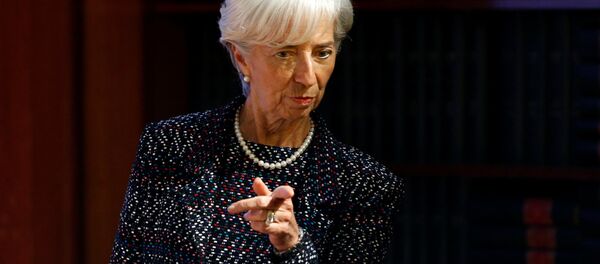Sputnik has discussed the possibility of a crisis in Asia with Christopher Bovis, professor of international business law at the University of Hull in England.
Sputnik: The head of the Asian Infrastructure Investment Bank warned of a crisis tougher than in the 90's amid US tariffs. How inevitable is it?
Christopher Bovis: It's a very valid comment. It's extremely likely that we have an escalation of a trade war between the United States and China and that would lead to a serious crisis because we do not have currently, the world does not have the institutional infrastructure to deal with tariff wars.
Sputnik: This is just because of the tariff war that's going on or are there other factors that are also possible contributors or risk factors for a financial crisis?
Therefore, it created not only the side effects of the trade imbalance which is the jobs, the employment and also the loss of competitiveness, but mainly, and the most important thing is, the ability to have a responsible system to address these issues domestically. That's why you have the American administration going to war with the Chinese administration about putting import duties and tariffs on anything that is crucial for the development of both their economies.
READ MORE: Venezuela Ditches the Greenback, Switches to Euros and Yuan: Consequences?
The other part is that most countries today, most economies today are addicted to debt, debt and borrowing becomes a serious synonymous part of the armory of any macroeconomic policy and that contributes to huge problems because it cannot take away any part of action that relates to autonomous responses.
Sputnik: We have actually seen quite a bit of volatility on the back of various tariffs that the US has imposed on Chinese goods all across Asian markets, which countries are the most susceptible? Is China, which is the second largest economy in the world, are they the most susceptible or are there other countries in Asia that are going to feel the bite of these tariffs and the bite of this trade war even more?
In fact, it doesn't solve the problem, it augments the problem because the imports to these economies are much more expensive than the exports. Therefore, it's sinking things further down into the abyss of uncertainty. It requires immediate reaction.
Sputnik: If the currencies were to feel the bite of a crisis wouldn't that actually spur an increase in exports on the back of those lower prices?
Christopher Bovis: China will easily take on any potential full-fledged war between the United States and itself because they have the mighty sums. They have also the currency to participate in international monetary systems in order to avoid any side effects of the trade war, the imposition of tariffs. The other economies, the emerging economies do not have that possibility. In fact, they have debt, China has debt, but it has tremendous amount of liquidity, it can fight back and it can win back.
READ MORE: G20 Finance Heads Warn Trade Wars to Dumpen Global Growth — Russian Central Bank
The other parties that are associated with China will have tremendous difficulty in understanding, first of all, the speed of reaction. They have to react pretty quickly, and the most important thing — the correct reaction, devaluing your currency is not the right solution. In fact, it's the wrong solution because it takes the entire economy further down into debt.
Sputnik: Do you think that there is actually a possibility that some countries may benefit from the trade war in Asian countries? We've already seen some kind of a shift towards countries like Vietnam, Cambodia for producing certain items that were traditionally made in China. Do you think that a trade war could actually see some kind of benefit tripling down, with the imposed tariffs, a shift towards goods coming from other countries in Asia, in Southeast Asia?
You see Vietnam, you see Singapore, you see other countries allowing that part of the world that is closely associated with China benefiting quite well and quite recently benefiting from these types of arrangements of economic hostilities between China and the United States. But this is short-term only because eventually it will come to a point that you also need to reinvent a new set of rules. Otherwise allowing a kind of a reactory policy into something which is a hostility for economic environment is not long-term, it is not conducive to investment, is not producing any certainty for investors and also for the domestic economy to grow positively in the years to come.
The views expressed in this article are solely those of Christopher Bovis and do not necessarily reflect the official position of Sputnik.







